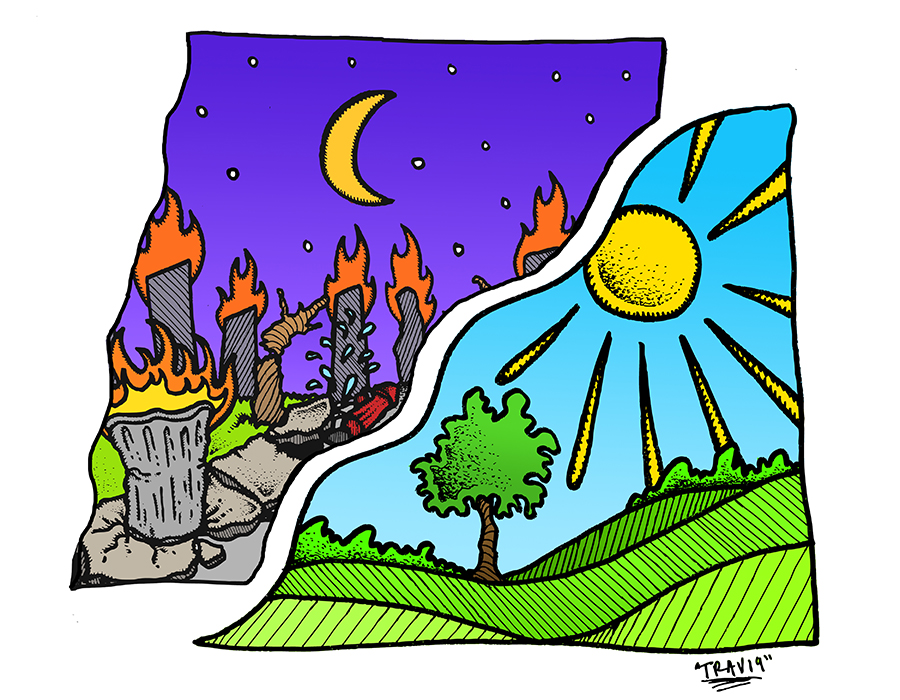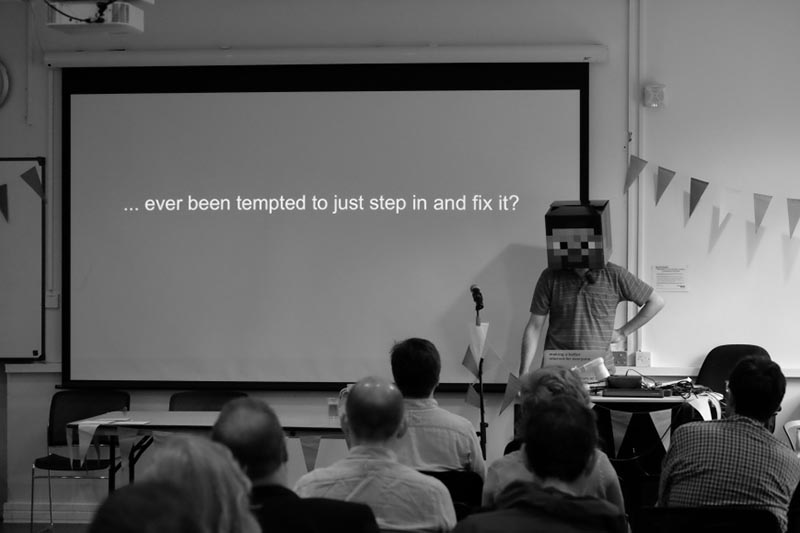Regular people are taking it upon themselves to make fixes and repairs around their cities, from cutting back overgrowth to filling in potholes.

The next time you walk through your neighborhood, observe your surroundings. At a glance, everything might appear in tip-top shape. But look closer and you may see that things are, well, falling apart. See the pothole in the street? That overgrown bush? The missing slats on those park benches?
Sure, the city might fix them…someday. But every once in a while, an anonymous hero comes along and does the work themselves. For those living in Cambridge, England, that work is likely accomplished by one do-gooder in particular: the Guerrilla Groundsman.
For a handful of years, the Guerrilla Groundsman been secretly fixing things around Cambridge, England, and then posting before and after photos of his works on Twitter and WordPress.
No one knows who he is, not even the woman who invited him to give a lecture at the inaugural Festival of Maintenance in London last September. There, he gave a PowerPoint presentation about his guerrilla public service while wearing a cardboard box resembling a Minecraft character atop his head.

But his identity doesn’t matter. What matters is that the Guerrilla Groundsman, despite being an unknown entity, has affected the lives of hundreds if not thousands of people through his work. He’s fixed benches with broken slats usable and transformed countless underpasses and roadsides into bounteous patches of lavender and daffodils. From vinyl he’s created new lettering for hard-to-read traffic signs notorious for misleading drivers. Trash cans have been brought back to life with the flick of his paintbrush and potentially injurious sidewalk cracks have been filled to safety thanks to him. He has cut back many an overgrown bush and returned a number of wayward shopping carts in his time, too.
“I’ve focused on stuff that the local council wouldn’t get around to fixing, little things that looked unloved,” the Guerrilla Groundsman told OK Whatever over email. “It’s been fun to research how to do the repair jobs. I’ve been into woodworking for a few years which was useful for the benches.”
He’s part of a larger movement called guerrilla public service and it’s a pay-it-forward concept that promotes repairing and maintaining public spaces instead of waiting for city workers to do something about it. This can include repainting faded traffic signs or starting community gardens, but it can also be something as simple as clearing a path from shrubs.
Guerrilla public service has been quietly catching on in the U.S. and U.K. for almost a decade. Artists have made freeway junctions in Los Angeles less confusing by installing new placards. They’ve put up more detailed signage in N.Y.C. subway stations to make it easier for people to find their trains, and humorous etiquette stickers in the London Underground to remind people of their manners. In San Francisco, concerned cyclists created an extra layer of protection by adding reflective traffic delineators to bicycle lanes, and one resident has been building and placing benches in neighborhoods for more than 40 years.
Other examples are more subtle. From snipping intrusive hedges to cleaning up after other people’s dogs, you’ve probably benefited from countless tiny acts of civic kindness without even knowing it.
“There are amazing individuals and projects striving to maintain, to repair, to reuse, to sustain, to steward, to remanufacture, and to recycle things of value,” Laura James, a U.K.-based engineer who helped launched the Festival of Maintenance, told OK Whatever through email. “Today we don’t value maintenance the way we value invention. We don’t recognize maintainers the way we do makers.”
She and a group of volunteers launched the Festival of Maintenance in 2018 to merge outreach with networking. The one day event — which takes place this year in Liverpool — included a series of educational lectures with titles like, “Status of Maintenance: What has happened and why?”
James sensed the timing for such an event was right. “There’s more interest in this now,” she said, because our cities have become too big and overextended.
The key to informally fixing things is not only doing the job well, but doing it right. It’s not enough just to repair stuff; you’ve got to ensure that it will last and not be removed by the city. That means matching shades of paint perfectly, mimicking exact fonts, and following uniform standards and specifications. Basically, your work should be so convincing that no one even notices it.
If you’re someone who enjoys praise and feedback, performing random acts of guerrilla public service might not be for you. It’s a mostly thankless endeavor — partially because you don’t want to get caught. If you are, you might get slapped with a ticket or even arrested for vandalism. It helps to consult city codes and ordinances before fixing things and to take action only when few people are around.
But, moreover, taking credit isn’t what guerrilla public service is about. It’s about keeping cities safe and beautiful, stepping up when resources are tight, and indirectly improving the lives of others just because you can.
For the Guerrilla Groundsman, what started as a habit of picking up litter while jogging progressed into larger acts of civic kindness. In fact, the good samaritan can still remember his first-ever act of guerrilla maintenance: cleaning “a really grimy” footbridge near where he used to work. Not only did he think it was an eyesore and something the city would likely never address, but it was also an interesting social experiment.
“I thought it would be fun to secretly start cleaning it so that people would wonder who had done it,” the Guerrilla Groundsman said.
After that experience, he became hooked. Everywhere he looked there were things that could use fixing or tidying up: broken fences, plots of soil that begged for flowers, bike paths that needed more gravel.
Over the years, quite a few people have spotted the Guerrilla Groundsman in action because he usually works on his projects in broad daylight. Sometimes he decides to do things spur-of-the-moment, but usually he pre-plans, bringing his own tools and dressing in paint-splattered clothing for dirty jobs.
“I always felt like wearing a yellow high-visibility jacket would be a bit dishonest or misleading,” the Guerrilla Groundsman said. “And also I think dressing up would draw more attention to myself which might make things harder.”
Not that he’s experienced much push-back. He can only remember one person ever complaining about a project, and he doesn’t blame them because the color he was using was not a match with the sidewalk stripes he was painting. His interactions with the public while repairing things tend to be positive, if unremarkable. Which in his case, isn’t a bad thing.
“Most people just walk past, but some people have asked me if I’m being paid for whatever I’m doing. When cutting back bushes, people have often thanked me and said they’ve been hoping someone would do it.”
Still, considering the potential legal ramifications, the Guerrilla Groundsman has his doubts about urging others to follow in his footsteps.
“I’ve never been sure whether this hobby is really a good idea or something I could recommend to anyone else,” he wrote.
So maybe don’t go repainting crosswalks in your neighborhood or fixing broken picnic benches in your local park. Think smaller. We’re pretty sure no one’s ever been arrested for picking up trash.
